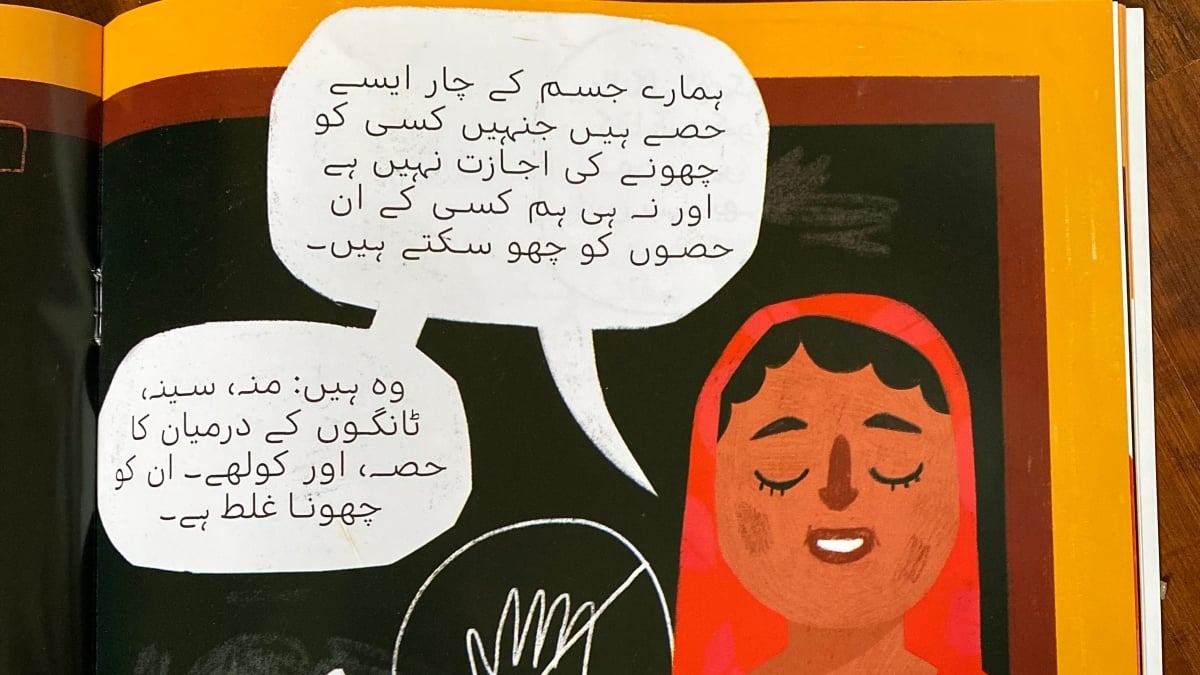This Pakistani children's book is on a mission to educate kids about sexual abuse
In a world where child abuse is alarmingly prevalent, parents need to be talking to their kids about bodily autonomy - and only when we talk about it, can we help to create a more intuitive understanding of consent for the little ones.
Mera Jism Mera Hai written by Ashhad Ahmed Qureshi is an illustrated children's book series that carefully debunks the myths and misconceptions around sexual abuse and provides free legal and mental health resources for children and their guardians.
Engaging and culturally sensitive, the book masterfully provides a much-needed healthy perspective on how to recognise and identify abuse and offer support to minor survivors who are unable to reveal their discomfort due to fear and confusion surrounding the topic.
"As a child, I was sexually abused for years by someone in my extended family. I remember how confused and helpless I had felt," shared Ashhad, as he explained why he felt compelled to write this book.
“I had so badly wanted to do something about it but I didn’t know what and I didn’t know how."
Also read: Parents, here's why your kids aren't too young to learn about sexual abuse
"But my story is just one of countless others. I was privileged that when I was able to finally disclose to my parents, I was able to get the support I needed to heal but I know many others are not so lucky. This is why I wrote this book —it is a book I wish I had had growing up."
Start having these conversations when they're young
Since resources of such nature are taboo and not widely available, the author chose to write it in Urdu, hoping that its reach and need as a curriculum requirement in educational institutes can help foster translations of the book in regional languages too.

Written in simple language - the book models conversations in an appropriate manner, educating children about their body and who is allowed to touch them. Vibrant illustrations by Aziza Ahmad further make the process of understanding seamless.

However, given the sensitivity and prevalence of the issue in our society, compiling the book was an arduous process, as Ashhad describes.
"Most of what I read on existing literature during my research was not suitable for a Pakistani context. Not even the language could be translated to Urdu easily. We don’t really have words in Urdu for personal space, body boundaries, and so on, at least not for everyday use. You can translate them for sure, but it would not carry the same meaning. I had to really think about how to convey the same concept but in a way that would be understood by everyone," said Qureshi.
This may be one reason why addressing children who are reading the book, is done in a tone that is both explanatory, yet careful and compassionate.

"I led a workshop with the program manager for mental health at Indus Health Network, where we put each word of the book under scrutiny. Is it simple to understand? Is it culturally appropriate? Is it respectful of people’s beliefs? Are there better ways of conveying the same concept?"
"After making all the necessary changes, we finally sent the manuscript to underserved areas in Karachi, where the community members (who would hopefully read this to their children in the future) provided their feedback and we made necessary changes," added the author.
Busting misconceptions
The book also provides an activity section where children can identify the family members they can trust and open up to. A similar guide is also available for parents where they can recognise changes in their children's behaviours and know something is troubling them accordingly.

Specifically, the book aims to clarify two misconceptions around bodily autonomy in the context of Pakistan. First, that perpetrators are distant strangers that only prey on immoral individuals. Second, that people who come out with their stories do it for attention and deserve the blame.
"In more than 80% of the cases, the perpetrators are known to the victims, usually family members or acquaintances," says Qureshi.
"The truth is that this issue is so heavily stigmatised that those who do speak up are speaking truth to power. They often risk losing everything, sometimes even their own lives (honour killings), so we, as a society, really need to think critically about what it must take for someone to disclose their experiences."
Thus, it encourages survivors to speak up about their experiences, and be vocal about it without internalising the shame.

Determined and emotionally evocative, the book is wholesome and its title, powerful.
"For so many of us in Pakistan’s collectivist society, our freedom and autonomy is stripped from us and chained to the approval of other, usually male, members of the family. I want the title of the book to be a fitting reminder to all of us that decisions around our bodily autonomy, respect, and dignity are ours to make, now and forever," says Ashhad.
"At the end of the day, the most important things that I hope readers, namely survivors, will take away from the book are that their experiences are real and should be believed, their ways of coping with them are valid, it was never their fault, and that they will always be deserving of love and support."
Priced at Rs275, you can buy a hard copy of the book here.












Comments